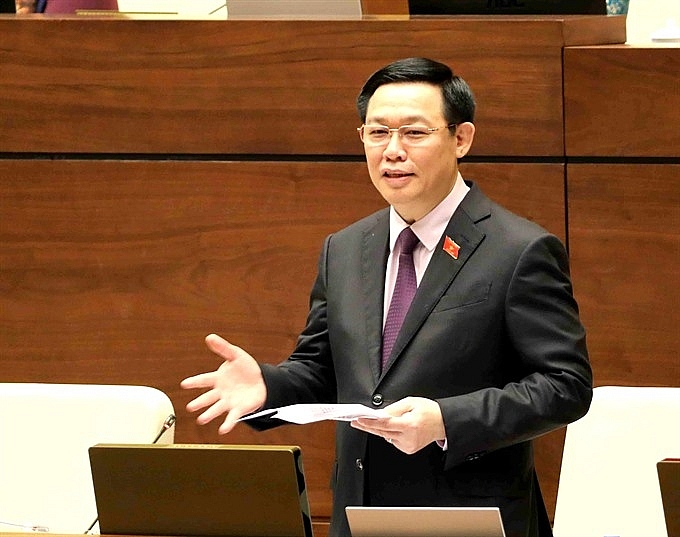Deputy PM fields lawmakers’ concerns on SEZs, cryptocurrency: NA
 |
| Deputy Prime Minister Vuong Dinh Hue responds to National Assembly deputies’ questions on June 6. - VNA/VNS Photo |
This was the first time Deputy PM Hue had fielded queries from lawmakers since assuming office in 2016.
Special economic zones
The three proposed special economic zones (SEZs) – Van Don, Bac Van Phong and Phu Quoc – received particular attention from lawmakers, with questions ranging from human resources development, leadership selection, implications on the planning of seven economic regions and national security.
Deputy PM Hue said “special zones mean the officials must also be special.”
He said the three-step process to choose the leader of the SEZ – nomination by the provincial chairman, assessment by the home affairs ministry, voting by the People’s Council and final approval from the Prime Minister – would be sufficient to “select a qualified and virtuous leader” to guide the success of the SEZ.
Regarding questions on the realistic effectiveness of SEZs to the Vietnamese economy as well as national security and the country’s sovereignty concerns regarding SEZs, Deputy PM said the zones are meant as a place to test out experimental policies.
He also affirmed that Hanoi and HCM City would continue to be the ‘economic locomotives’ of the country and receive focal resources support, whether or not the proposed SEZs come into existence.
NA Chairwoman Nguyen Thi Kim Ngan said SEZs laws are still being studied and asked unsatisfied deputies to allow the Deputy PM to answer later via documents.
Cryptocurrency
Deputies asked Deputy PM Hue on the Government’s plans for managing virtual currency, to which he said the State Bank has announced bitcoin as an illegitimate currency in Vietnam.
However, Deputy PM admitted there is a “robust market” for bitcoin transactions in the country, therefore ministries and agencies must study international practices to implement reasonable policies.
Related mining rigs importation in the country, with the latest data from finance ministry showing that 15,600 rigs have been imported into Vietnam, Deputy PM said the Government is considering whether to ban the import of cryptocurrency mining machines, but only if a legal basis for such ban could be constituted.
Other issues
Deputy Huệ also delivered a report on the economy in the first five-months of 2018, affirming that the overall trend of positive growth is continuing and the macro-economy remains stable, with a strong US$3.4 billion export-import surplus, a 9.8 per cent increase in foreign direct investment and stable growth in all sectors.
However, he admitted there are still causes for concern, including the slowing of industrial production, underwhelming progress in administrative reforms and sluggish budget disbursement in key projects.
Other issues raised at the Q&A session include transparency in public-private partnership projects, anti-corruption efforts, increasing retirement age, credit priorities for the climate change adaptation programmes in Mekong Delta and tackling fake and overpriced medicine.
Deputy PM Hue was the last cabinet member to participate in the Q&A session covering four topics (traffic and transport, environment and natural resources, education and training, labour and social affairs) in the ongoing 14th National Assembly’s meeting.
The Q&A format, restricting the time for questions down to one minute each and answers down to three minutes each, proved to be effective and was appreciated by both NA deputies and citizens alike, said NA Chairwoman Nguyen Thi Kim Ngan during her closing speech.
250 deputies questioned Government members during the three-day session.
What the stars mean:
★ Poor ★ ★ Promising ★★★ Good ★★★★ Very good ★★★★★ Exceptional
Related Contents
Latest News
More News
- Spring Fair 2026 boosts domestic demand (March 02, 2026 | 16:30)
- Law on Investment takes effect (March 02, 2026 | 16:21)
- Ho Chi Minh City attracts nearly $980 million in FDI in early 2026 (March 02, 2026 | 10:57)
- Businesses bouncing back after turbulent year (February 27, 2026 | 16:42)
- VinaCapital launches Vietnam's first two strategic-beta ETFs (February 26, 2026 | 09:00)
- PM sets five key tasks to accelerate sci-tech development (February 26, 2026 | 08:00)
- PM outlines new tasks for healthcare sector (February 25, 2026 | 16:00)
- Citi report finds global trade transformed by tariffs and AI (February 25, 2026 | 10:49)
- Vietnam sets ambitious dairy growth targets (February 24, 2026 | 18:00)
- Vietnam, New Zealand seek level-up in ties (February 19, 2026 | 18:06)

 Tag:
Tag:




















 Mobile Version
Mobile Version